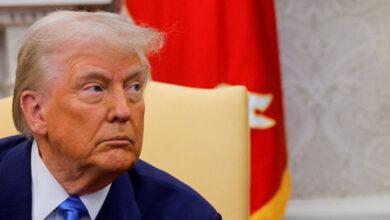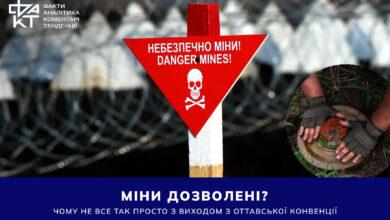Canada and Mexico expect an influx of migrants due to Trump’s new deportation plans

Immediately after his re-election to the post of President of the United States, Donald Trump said that he had “no other choice” but to deport a certain number of the 11 million illegal immigrants from the country.
The fight against illegal immigration has been one of Trump’s priorities during his past tenure in the Oval Office of the White House. From the beginning of the 2016 election campaign, Trump advocated for active restrictions on illegal immigration and reform of immigration policy. And he slammed Kamali Harris during this year’s debate because of her poor handling of the issue.
Fighting illegal immigration is important to Trump for several reasons. First, he considers it a threat to national security, because illegal migrants can be criminals or terrorists. Second, Teflon Don is sure that illegal immigrants are taking the jobs of authentic Americans and overburdening social services. In these reasons, he meets the warm support of his voters.
“Stay in Mexico”
Policies developed by the Trump administration during his last term were aimed at reducing the number of illegal immigrants seeking a better life and reducing the burden on the US asylum system. One of the key points of his 2024 election campaign was the construction of a wall on the border with Mexico. The strengthening of control at the border should be facilitated by an increase in funding of the border service and bodies dealing with the deportation of illegal immigrants. Corresponding changes in the legislation were intended to limit the granting of asylum to certain categories of migrants, especially those who arrived in the United States through Mexico. The Trump administration developed the “Remain in Mexico” policy, which required asylum seekers to remain in Mexico while their cases were being reviewed by the U.S. Department of Justice.
Roxham Road is a “corridor” for asylum seekers
During Trump’s first term, his administration announced the end of Temporary Protected Status – TPS – for citizens several countries, Haiti in particular. TPS provided Haitians with protection from deportation because of the catastrophic 2010 earthquake. Revoking this status threatened deportation for many Haitians already living in the United States. In response to these changes, thousands of islanders had to seek refuge in neighboring Canada.
The “road of life” for migrants traditionally served as a crossing on the Roxham road, laid through the countryside in the direction of the Canadian state of Quebec. This corridor has long been an unofficial entry point for people seeking to cross the border safely and apply for asylum in Canada.
Canadian authorities were challenged by such a sudden influx of migrants, and additional resources were deployed to secure the border and house the new arrivals. The situation has led to active discussions between Canada and the US on issues of migration policy.
In 2023, after the adjustment of the Safe Third Country Agreement between the two English-speaking countries of North America, this route was closed for refugees. The amendments made extended the effect of the agreement to the entire land border between them. This meant that anyone trying to cross the border illegally was now subject to re-entry into the US, something that had previously been limited to official crossings.
The Royal Canadian Mounted Police (RCMP), which is responsible for border security and public order, has said it is ready to meet new waves of migrants. The RCMP has developed special plans in case of a significant increase in attempts to cross the border illegally. There are scenarios in which hundreds of people would try to cross the border every day.
Asylum seekers who crossed the border into Canada hoping to get protection in the United States will be denied. Instead, their requests will await official consideration among a quarter of a million similar requests. Probably, they will have to be in limbo for years, because on average, such cases are considered for about 4 years.
Experts are concerned that with limited access to official crossing points, refugees who have lost legal means of crossing the border and become desperate will seek new, often dangerous, routes. The Canada-US border stretches for more than 5,500 miles and includes many inaccessible and dangerous areas. Travel in these areas can be deadly due to the difficult terrain and harsh weather conditions, especially in winter.
Searching for a better life at the risk of life
The closure of unofficial crossings such as Roxham Road will inevitably lead to an increase in risky crossings, as desperate families are often willing to take any risk in search of a better life. The Canadian government and immigration officials believe that tighter border controls could reduce the number of illegal migrants. However, experts and human rights defenders are concerned about safety and call for safe and legal routes for people seeking asylum.
In January 2022, a tragic incident drew attention to the risks involved in illegally attempting to cross the Canada-US border. Then a family of four, including a child, died while trying to cross from Canada to the United States. Extreme weather conditions, including high winds and deep snow, made the trip deadly, police said.
Another similar incident happened last year, when the bodies of eight people, including two young children and their parents, were found on the banks of the St. Lawrence River. This group was found trying to cross the border near the Mohawk community of Akwesasne in an area that spans parts of Quebec, Ontario and New York state.
In Quebec, the province that has received most of the migrants trying to cross the border, local politicians are worried about the federal government’s preparedness for a possible repeat of the migration crisis that occurred during Trump’s first term. At that time, numerous migrants headed to Canada through unofficial crossing points, a significant part of which was located in Quebec.
The leader of the Bloc Québécois party, which supports the province’s independence, has openly criticized Canada’s federal government. He stated that Ottawa does not recognize the seriousness of the situation, which may escalate again. He believes that infrastructure should be improved to identify new routes that smugglers can use to smuggle people across the border.
Political leaders in Quebec believe that without proper action by the federal government, such illegal routes could become more popular and potentially dangerous, as smugglers could use riskier routes through harsh natural areas.
Quebec’s premier has expressed concern about the province’s ability to accept many new migrants. He said resources may be lacking and that social and health services are already overstretched. Although border control is the task of the federal government, the premier noted that Quebec can monitor some crossings on its own. He believes that if the government does not do enough, local authorities should be ready to ensure order and security.
Canada’s deputy prime minister said Canada must be vigilant about who enters the country and ensure border security. The government is developing strategies to protect the national interest and ensure a humane approach to migrants seeking asylum.
Public opinion on Trump’s “zero tolerance” for illegal immigrants
Public opinion on Trump’s desire to fight illegal immigration in the US is polarized. Trump’s supporters mostly approve of his tough stance on illegal immigration. They believe that the fight against illegal asylum seekers contributes to increasing the level of security in the country, reducing the risk of crime and terrorism. Many of the followers of the 45th and 47th presidents believe that illegal immigrants provoke dumping in the labor market and occupy places that could be occupied by US citizens. Some supporters see Trump’s immigration policy as a way to preserve national culture and values.
In contrast, Trump’s opponents, including Democratic supporters, human rights activists and some independent voters, condemn harsh methods such as separating families at the border, holding children in detention centers, and “zero tolerance” policies, believing that it violates human rights. Trump’s policies have caused concern in relations with neighboring countries, especially Mexico, because of the “Remain in Mexico” policy and demands for wall funding. Some critics believe that for Trump, illegal immigration is primarily a political tool to incite fear among voters and create a negative image of immigrants to increase social tension.
Tetyana Viktorova





